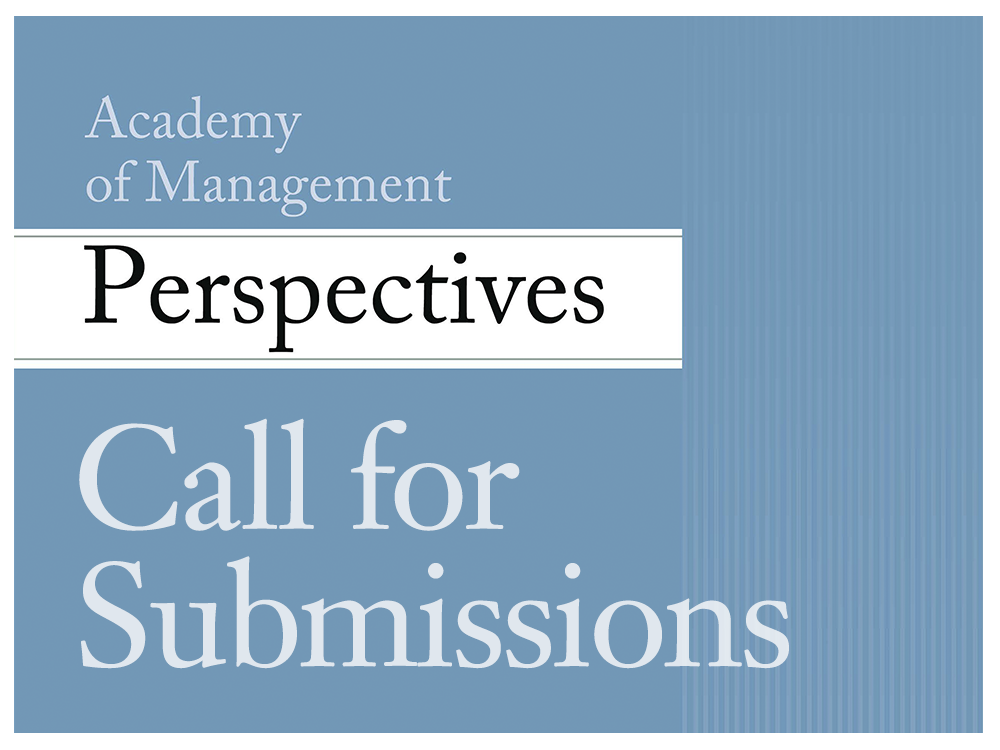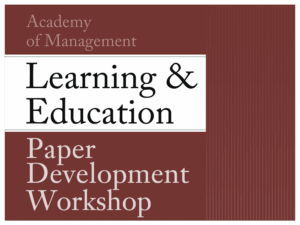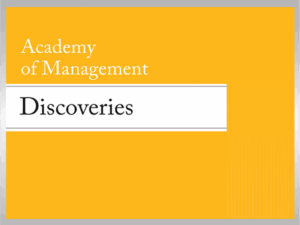See the related Paper Development Workshop details for this Special Issue.
Guest Editors:
- Sophie Bacq, IMD, Switzerland
- Janet Bercovitz, University of Colorado, USA
- Frank de Bakker, IESEG School of Management, France
- Aline Gatignon, University of Pennsylvania, USA
- Irene Henriques, York University, Canada
AMP Associate Editor:
- Sandro Cabral, Insper, Brazil
Background
The COVID-19 pandemic underscored that complex problems cannot be effectively tackled by organizations acting in isolation. Collaboration between businesses, governments, and civil society organizations proved necessary. The coordinated response from pharmaceutical companies, public authorities, nonprofit organizations, and social enterprises leveraging their financial resources, expertise, and local knowledge to develop and distribute reliable and effective vaccines, was vital in saving lives worldwide. 1 This cooperation not only addressed immediate public health needs but also established a precedent for future collaborative responses to global challenges. Similarly, major technological innovations such as smartphones owe their existence to substantial public investments in basic research, the entrepreneurial spirit of private innovators, and the significant contributions of nonprofit institutions like Stanford University.2 In the same vein, coordinated actions between firms and civil society groups have proven essential in reducing deforestation and increasing community well-being while ensuring economic benefits for businesses and numerous stakeholders in underserved communities.3
Despite these success stories, management scholarship has been slow to embrace the full complexity of cross-sectoral collaborations. It frequently emphasizes free-market solutions and the business case for collaboration—such as how firms can leverage relationships with public and civil society organizations—while tending to overlook broader societal challenges. 4 In this special issue, we aim to highlight practical ways that these relationships can be reshaped to better address the evolving social, environmental, and economic challenges of our time.
Scope and Open-Ended Research Questions
We invite scholarly studies that explain how the major challenges of our time can be or have been better addressed through specific reconfigurations of the relationships between firms, governments, and civil society organizations, which include nonprofits cooperatives, associations, and social movements. We encourage both conceptual and empirical papers that are grounded in rigorous analysis and support specific and significant managerial and policy actions. In short, we want papers that show what can or does work, in ways that managers and policymakers can use.
Please note that AMP’s mission and format differ from many other leading academic journals. AMP papers are managerially driven, not theory driven. Successful submissions clearly define the managerial issue from the outset and make a compelling case for its importance. They do not simply tack managerial implications on to a standard academic study. Rather, AMP papers provide actionable insights that guide managerial behavior and influence policy decisions. We strongly encourage potential authors to review AMP’s guidelines at aom.org/amp before submission. Note that we also welcome Practitioner Perspectives essays and Constructive Confrontations papers for this special issue. Guidance for both formats is also on our website.
For this special issue, we welcome submissions of relevant, rigorous, and readable papers that address a broad range of topics, including but not limited to the following:
- Bridging Different Perspectives and Interests: Which frameworks and processes can bring together diverse stakeholders with differing objectives to foster alignment and cooperation? How can collaborations be structured to benefit all parties involved? How do firms, either in isolation or in collaboration with other cross-sector partners, reconcile financial performance and societal goals?
- Accounting for Power Imbalances: How can the power disparities between larger entities, such as governments, multilateral organizations, multinational corporations, and smaller actors, such as nonprofits, local communities, and disenfranchised groups, be addressed to foster more equitable and effective partnerships? What innovative approaches can mitigate these imbalances and ensure that all actors are meaningfully included in decision-making? How can we foster collaborative governance arrangements and effectively engage firms, nonprofits, and civil society organizations when governments take a leading role in these efforts, particularly in addressing grand challenges?
- Integrating Understudied or Underserved Communities: How can we center the voices of understudied or underserved communities in cross-sector collaborations? How can we avoid “helicoptering” solutions into and out of these communities? What roles can these communities play as central actors in addressing societal challenges?
- Geographic Levels of Collaboration: How do solutions to societal problems vary across different geographic levels, from local to global? How can polycentric governance models—where decision-making occurs across multiple, interconnected scales—be employed to address global challenges while considering local needs? What level of analysis should managers adopt as they consider these challenges?
- Institutional Context and Country Settings: How can institutional frameworks and country-specific factors be accounted for and managed in cross-sector collaborations? How can different governance structures, legal frameworks, and cultural contexts be addressed to improve the success of these partnerships? How does corporate political activity by one or more parties alter cross-sector partnership dynamics?
- Micro-Processes of Collaboration: What are the specific, day-to-day processes through which individuals from different sectors—public, private, and civil society organizations—build trust, share knowledge, and foster collaborative solutions? How can managers encourage individuals to spend time in other sectors and how can this time be structured to break down barriers to collaboration? How can these individual interactions be scaled up to influence larger organizational and societal outcomes and, eventually, social and environmental impacts?
- Impact Measurement in Cross-Sector Collaborations: How can we measure the long-term societal impact of partnerships between businesses, governments, nonprofits, and civil society organizations? What frameworks are most useful in assessing both financial and non-financial performance, including social and environmental benefits?
- The Role of Communication and Social Media: How can communication practices, information technologies, and social media platforms be leveraged to enhance transparency, accountability, and collaboration between businesses, governments, and civil society organizations?
In an era where the intersection of business, government, and civil society has never been more critical, we encourage submissions that offer fresh perspectives and innovative solutions that managers and policymakers can implement to reshape these relationships for a more equitable and sustainable future.
Deadline, Submission, and Review Process
The submission deadline is 31 October 2025. Papers must be submitted on the AMP website at https://mc.manuscriptcentral.com/amp.
All papers will be reviewed according to the current policies of Academy of Management Perspectives. AMP papers should be grounded in evidence or robust conceptual frameworks, address relevant real-world managerial and policy issues, offer actionable insights, avoid theory fetish, and be written in a style accessible to non-specialists and practitioners.
We intend to host a Paper Development Workshop at the 2025 AOM Conference in Copenhagen for selected authors to further develop their manuscripts. Participation in this workshop is neither a guarantee nor a prerequisite for publication. This special issue is expected to be published in 2027.
Endnotes
1 S. Bacq and G. Lumpkin, G. “Social Entrepreneurship and COVID‐19,” Journal of Management Studies 58, no. 1 (2021): 285; S. Cabral, Strategy for Public and Nonprofit Organizations: An Applied Perspective (London: Palgrave Macmillan, 2024).
2 M. Mazzucato The Entrepreneurial State: Debunking Public vs Private Sector Myths (New York: Anthem Press Mazzucato, 2013).
3 S. Bacq, C. Hertel, and G. Lumpkin, (2022). “Communities at the Nexus of Entrepreneurship and Societal Impact: A Cross-Disciplinary Literature Review,” Journal of Business Venturing 37, no. 5 (2022): 106231; M. L. Barnett, I. Henriques, and B. W. Husted, “Beyond Good Intentions: Designing CSR Initiatives for Greater Social Impact,” Journal of Management 46, no. 6 (2020): 937–64; A. Gatignon and L. Capron, “The Firm as an Architect of polycentric Governance: Building Open Institutional Infrastructure in Emerging Markets,” Strategic Management Journal 44, no. 1 (2023): 48–85; G. Lumpkin and S. Bacq, “Civic Wealth Creation: A New View of Stakeholder Engagement and Societal Impact,” Academy of Management Perspectives 33, no. 4 (2019): 383–404; A. M. McGahan and L. S. Pongeluppe, “There Is no Planet B: Aligning Stakeholder Interests to Preserve the Amazon Rainforest,” Management Science 69, no. 12 (2023): 7860–81.
4 S. Cabral, J. T. Mahoney, A. M. McGahan, and M. Potoski, “Value Creation and Value Appropriation in Public and Nonprofit Organizations,” Strategic Management Journal 40, no. 4 (2019): 465–75.


